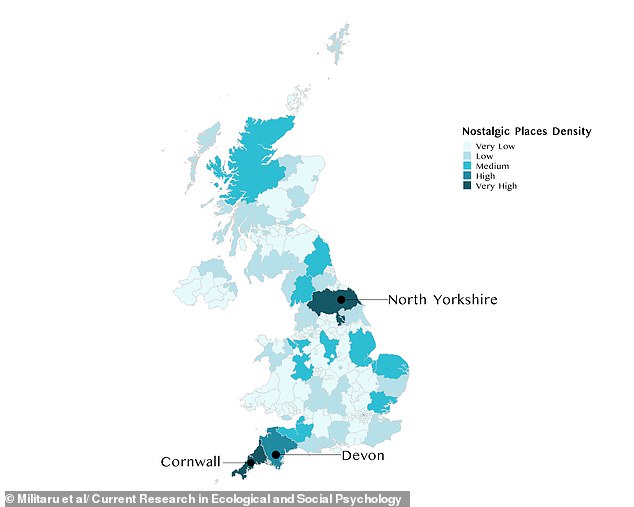[ad_1]
Many of us have fond childhood memories that we feel sentimental about.
But certain parts of the UK are more likely to trigger a sense of nostalgia than others, according to a new study.
Experts from Cambridge University asked 200 people from across the country to identify and describe the places they were most nostalgic about.
And they were surprised by what people said.
‘We expected people to be more often nostalgic for green places since so many studies emphasise the psychological benefits of green, natural environments’, Dr Elisabeta Militaru, who led the research, said.
‘We were surprised to find that blue places are the hallmark feature of place nostalgia.
‘Our findings add to the growing evidence that blue places are associated with increased psychological well-being.’
They used their findings to create a map of the most nostalgic places in the UK – so, do any trigger a sense of wistful affection for you?

The researchers created a map to show the most nostalgic places in the UK with Cornwall, Devon and North Yorkshire scoring highly

People were particularly nostalgic about places in Cornwall, the researchers found. Pictured: Porthminster Beach in St Ives

Devon, which also has some of the most popular coastlines in the country, was a partcularly nostalgic place. Pictured: Sidmouth Beach and the red-coloured cliff face of Salcombe Hill
They discovered that people in the UK are more likely to feel nostalgic towards places by the sea, lakes or rivers than they are towards fields, forests and mountains.
The map indicates that people were particularly nostalgic about places in Cornwall and Devon – which have some of the most popular coastlines in the country.
North Yorkshire also performed well, perhaps because it blends blue and green – boasting a long coastline and the Yorkshire Dales.
Overall, seaside and oceanside spots account for over a quarter of nostalgic places identified by UK residents.
This could be because coastlines have the optimal visual properties to make us feel positive emotions, the researchers said.
Areas including Norfolk, Essex, Somerset, Northumberland and the Scottish Highlands – all of which also have coastlines – also scored high for nostalgia, the map shows.
They also found that urban spaces accounted for a fifth of nostalgic places while agricultural areas, mountains and forests and rivers and lakes accounted for 10 per cent each.
‘The idea that places serve as an emotional anchor is not new,’ Dr Militaru said.

North Yorkshire also performed well, perhaps because it blends blue and green – boasting a long coastline and the Yorkshire Dales. Pictured: Robin Hoods Bay in North Yorkshire

Scenes such as this, at Bamburgh Beach in Northumberland, may be a fond memory for many people
‘Nearly 3,000 years ago, Homer wrote of Ulysses’ longing to return to his homeland, Ithaca. We wanted to understand what makes certain places more likely to evoke nostalgia than others.’
She suggested that places by the coast, river or lake make people feel nostalgic because they have particular visual properties.
Participants often described nostalgic places with words like ‘beautiful’, ‘aesthetic’, or ‘views’.
The findings were published in the journal Current Research in Ecological and Social Psychology.
Previous studies involving the same researchers have shown that brightness, colour saturation and contrast all contribute to the feelings which places elicit.
Blue places are often bright, saturated and high in contrast which may contribute to their restorative effects, the team explained.
‘People don’t like extremely chaotic outlines of the kind you might see in the middle of the forest, where you don’t get a sense of openness,’ Dr Militaru said.
‘People also don’t like too little complexity.

The findings revealed that a lot of people also thought Essex triggered nostalgia. Pictured: Butlin’s holiday camp in Clacton-on-Sea, Essex

The Scottish Highlands also scored high for nostalgia. Pictured: People exploring Fairy Glenn on the Isle of Skye
‘With an urban skyline, for instance, there are very few breaks in the scene’s pattern.
‘Seaside, rivers and lakes may give us the optimal visual complexity, but more work is needed to fully understand this.’
The study also revealed that reminiscing about a nostalgic place has significant psychological benefits.
When people think about nostalgic places, they feel more connected to others, their lives seem more meaningful, their self-esteem increases, as does their sense of authenticity, the researchers found.
‘Nostalgia brings places into focus, much like a magnifying glass,’ Dr Militaru said.
‘Meaningful places tend to be physically far away from us, yet nostalgia brings them back into focus and, in so doing, connects our past self to our present and future self.’
[ad_2]
This article was originally published by a www.dailymail.co.uk . Read the Original article here. .

